Prime Minister of Barbados Mia Mottley (Photo: Barbados Today)
One week after her Barbados Labour Party’s (BLP) historic victory at the polls and getting to work on the economic reality in Barbados — meeting with social partners, trade unions and the business community — Mia Mottley telephoned managing director of the International Monetary Fund (IMF) Christine Lagarde.
The new prime minister and minister of economic affairs and investment, for the most part, seemed to have a genuine approach, relying on the perspective:
“A major economic restructuring was now necessary in the face of an out-of-control debt of 175 per cent of gross domestic product, an estimated $15 billion, which is said to be $9 billion more than what the previous Democratic Labour Party (DLP) Administration inherited in 2008 when it took office.”
According to Mottley: “I briefed her on the present state of the public finances, the current debt and reserve positions, and assured her that we are committed to taking decisive action to rebuild Barbados.
“My Government and all parts of the social partnership agree that there is no avoidance in the delay in treating the economic and financial irresponsibility of the recent past. Our national reconstruction starts today. We set course, not on the easy or quick path but the right path. We will protect the most vulnerable, but we will all have to make sacrifices for our country.”
In a statement the IMF managing director said: “As announced by Prime Minister Mottley earlier today, the Barbados economy has been going through significant challenges for some years. The authorities are developing an economic reform plan designed to address these challenges, and they have asked the international community and the IMF to assist them as they put the economy back on a path to recovery. An IMF team led by Bert van Selm will be visiting Bridgetown to start discussions on how the fund can support the authorities’ economic plan. Our ultimate goal is to help Barbados achieve higher living standards and more inclusive growth for the years ahead.”
This is of particular interest considering that Barbados was in a similar situation in the 1990s. The Erskine Sandiford-led Administration used a stabilisation and adjustment programme. The results were job losses and eight per cent wage cuts for public servants and the demise of the DLP Administration.
http://www.jamaicaobserver.com/opinion/barbados-telephoned-the-imf-is-st-lucia-next-_135038




Leave A Comment